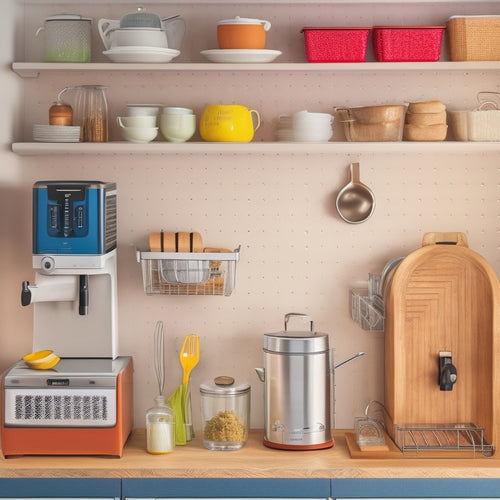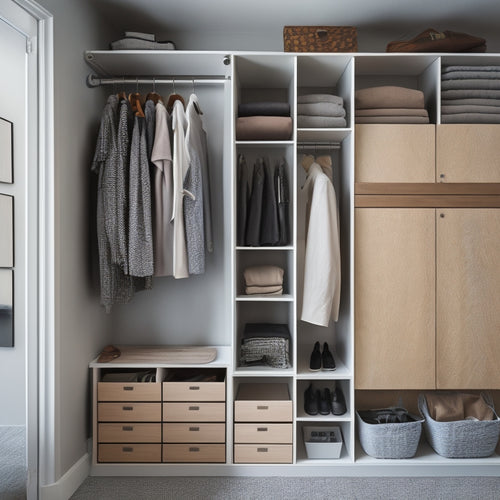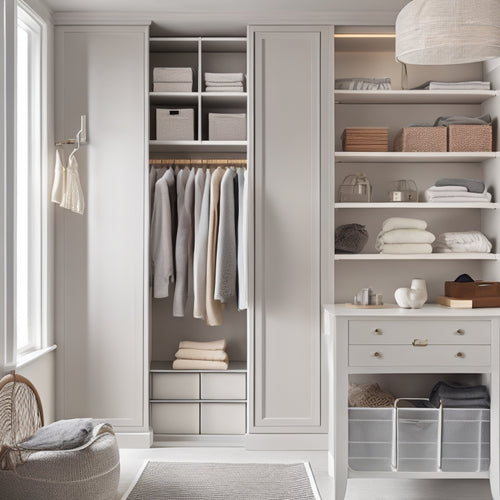
Streamlined Checklist for Decluttering Success
Share
To achieve decluttering success, start by identifying areas needing attention, establishing a decluttering mindset, and identifying energy-draining spaces. Next, adopt sustainable practices and prioritize stress-inducing areas. Efficiently organize your space by assigning a home for each item, using storage solutions, and implementing a 'one in, one out' policy. Finally, maintain your decluttered space by establishing habits, regularly tidying up, and reducing paper clutter. By following this streamlined checklist, you'll be well on your way to a clutter-free space. To secure long-term organization and maximize your efforts, take the next step towards creating a tailored plan that suits your unique needs.
Key Takeaways
• Identify areas needing attention, prioritize stress-inducing spaces, and establish a decluttering mindset to focus efforts effectively.
• Categorize items, containerize belongings, and consolidate similar items to efficiently organize your space.
• Assign a home for each item, use storage solutions, and implement sustainable practices to maintain organization.
• Establish habits for ongoing maintenance, regularly tidy up, and reduce paper clutter to prevent clutter buildup.
• Adopt a 'one in, one out' policy and create a tailored plan to secure long-term organization and maximize decluttering efforts.
Decluttering Priorities to Focus On
First and foremost, pinpointing the areas of your life that need the most attention is vital, as decluttering can be an overwhelming task if not approached strategically.
Establishing a decluttering mindset is essential to prioritize areas that require immediate attention. This mindset allows you to focus on the most critical aspects, ensuring a sustainable approach to decluttering.
Identify areas that drain your energy, cause stress, or hinder productivity. By doing so, you can allocate your time and resources effectively, tackling the most pressing issues first.
Adopting sustainable practices, such as recycling, repurposing, and donating, will further support your decluttering efforts, promoting a more organized and environmentally friendly lifestyle.
Strategies for Efficient Organization
Three essential strategies for efficient organization are categorization, containerization, and consolidation. These strategies help to maximize space, reduce clutter, and streamline daily routines. By implementing these strategies, individuals can optimize their time management and create a more structured environment.
Here are four key takeaways to contemplate:
-
Assign a home: Designate a specific place for each item to maintain order and prevent clutter buildup.
-
Use storage solutions: Invest in storage bins, baskets, and shelves to keep belongings organized and out of sight.
-
Implement a 'one in, one out' policy: Remove or donate an item each time a new one is acquired to maintain a balanced amount of possessions.
- Schedule regular maintenance: Set aside time each week to maintain organization and prevent clutter from accumulating.
Maintaining Your Decluttered Space
To guarantee that your newly decluttered space remains organized and clutter-free, it is essential to establish habits and routines that promote ongoing maintenance and upkeep.
Developing mindful habits, such as regularly tidying up and putting things back in their designated places, will help prevent clutter from building up again.
Implementing sustainable practices, like reducing paper clutter by switching to digital documents and adopting a 'one in, one out' policy, will also support long-term organization.
Frequently Asked Questions
How Do I Stay Motivated During the Decluttering Process?
As you commence on your decluttering journey, envision a phoenix rising from the ashes, symbolizing transformation. Stay motivated with inspirational quotes, accountability partners, and setting rewards for milestones achieved, while tracking progress to celebrate small wins.
Can I Donate or Sell Items That Are Still in Good Condition?
When decluttering, consider donating gently used items to local charities or selling them through consignment shops, online platforms, or garage sales, generating a sense of purpose and potentially earning extra income.
What Are Some Creative Ways to Repurpose Old Items?
Imagine transforming an old ladder into a functional bookshelf, like a Phoenix rising from the ashes. Upcycling projects breathe new life into discarded items, fostering creativity and DIY organization. Repurpose old items into unique, functional pieces that tell a story.
How Do I Handle Sentimental Items That Hold Emotional Value?
When confronted with sentimental item dilemmas, acknowledge the emotional value attached to cherished possessions. Create a memory box or digital archive to preserve sentimental significance, allowing you to let go of physical clutter while honoring the emotional connection.
Are There Any Specific Decluttering Tools or Supplies I Need?
"Ah, the age-old myth: 'I need special tools to declutter.' Nope, just a willingness to let go. That said, labels, bins, and a 'one in, one out' mindset can aid your organizational tips and decluttering techniques, leading to a minimalist lifestyle with practical storage solutions."
Related Posts
-

Smart Storage for Small Kitchen Appliances
You can optimize your small kitchen's functionality by implementing smart storage solutions that efficiently stash sm...
-

7 Best Compact Closet Storage Ideas for Tiny Homes
You're looking for compact closet storage ideas to maximize your tiny home's space. Start by doubling your hanging sp...
-

Mastering Small Closet Organization: Proven Strategies Unlocked
You're about to reveal the secret to transforming your small closet into a functional haven, where every item has its...


